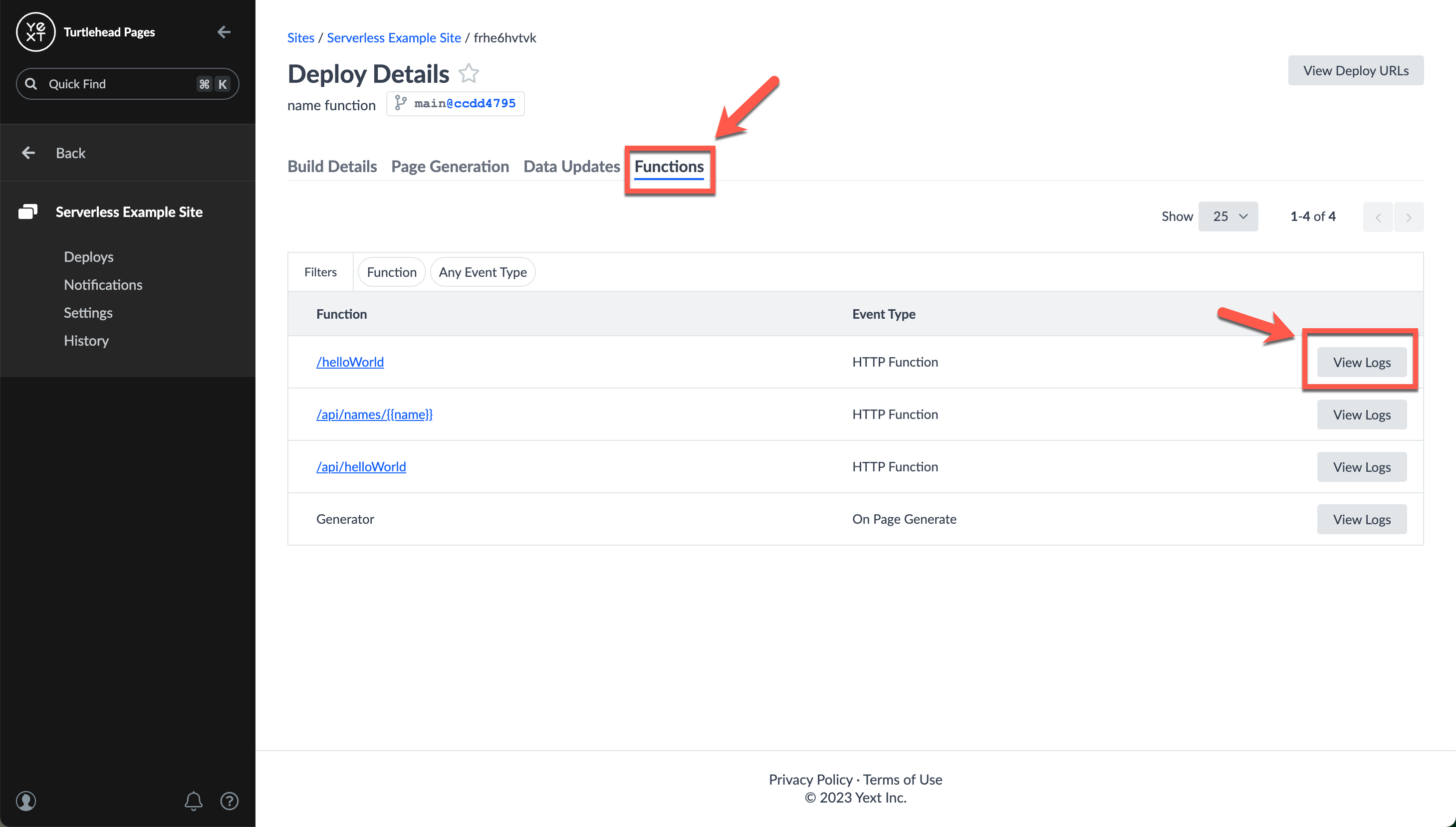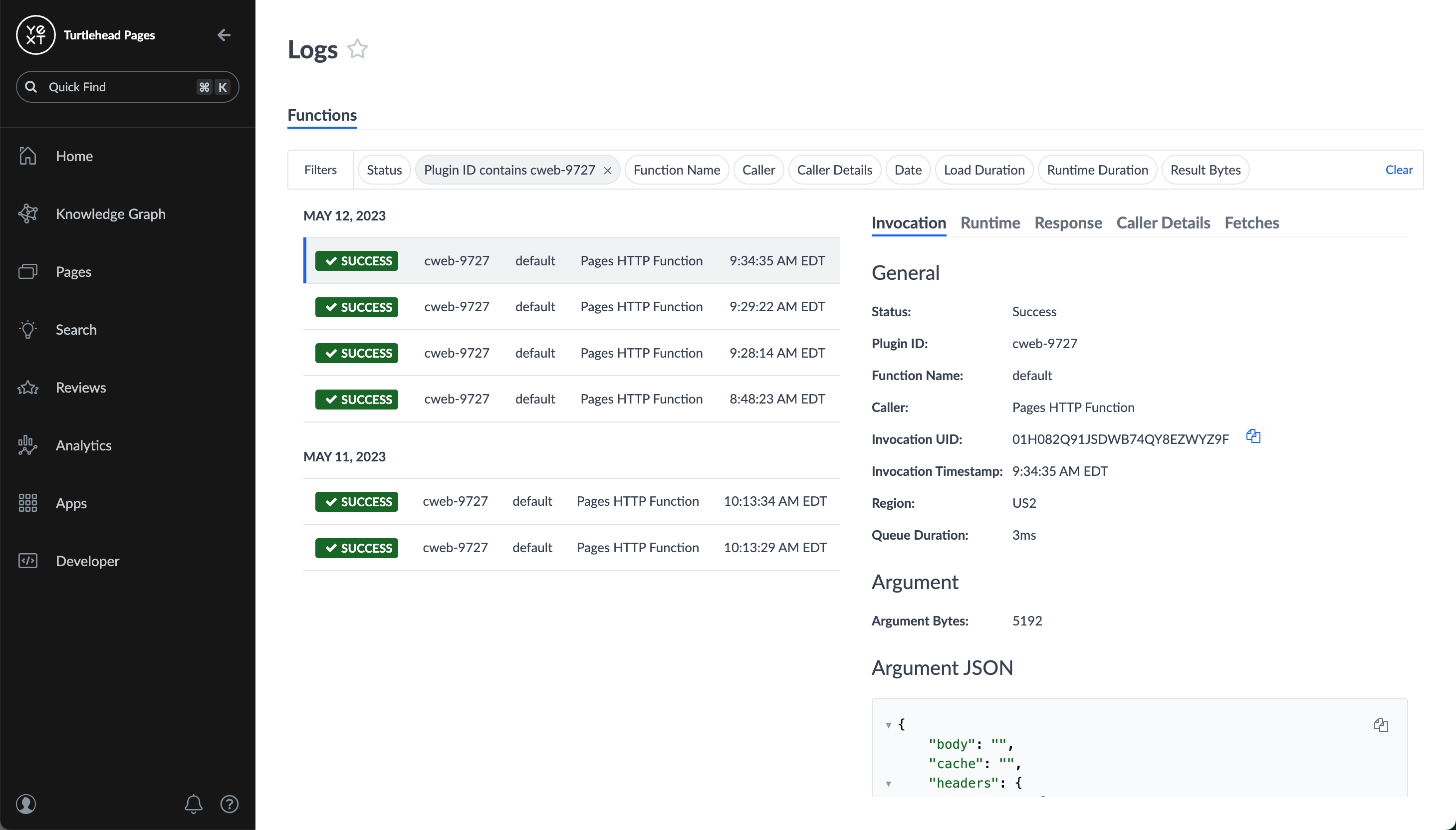HTTP Serverless Functions (< PagesJS 1.0.0) | Yext Hitchhikers Platform
This is documentation for the beta version of PagesJS (<1.0.0), which is no longer actively maintained.
For up-to-date documentation, refer to the HTTP Serverless Functions reference doc.
Overview
HTTP serverless functions allow you to write API endpoints that are served by the Pages system. Setting up a serverless function is straightforward and allows you to write custom code that executes when your endpoint is hit in the browser or by any HTTP client.
Getting Started
Foldering
All Pages serverless functions live in the top-level functions directory. For a function to be exposed as an HTTP endpoint, you must write a TypeScript file under functions/http.
Here is a simple example, which exposes the following endpoint relative to the base URL of your site: /helloWorld.
functions
└── http
└── helloWorld.tsPages also supports path parameters and deeper directory nesting. The following structure exposes the following endpoints relative to the base URL of your site:
/helloWorld/api/helloWorld/api/names/{{name}}functions └── http ├── api │ ├── helloWorld.ts │ └── names │ └── {{name}}.ts └── helloWorld.ts
In the above example, the path parameter name is made available in the TypeScript module {{name}}.ts in the body of the argument to the main function.
Function Format
To create an HTTP endpoint, you must declare a default export per file, using the following general syntax:
export default function helloWorld(request) {
const { pathParams, queryParams, site } = request
return {
body: "Hello World",
headers: null,
statusCode: 200
}
}The default export from each file will be supplied one argument (request, in the example above), which includes any environment and invocation-specific information, and will be executed whenever the endpoint is hit by any HTTP request method (GET, PUT, POST, etc.).
Argument and Return Value Interfaces
Refer to the following argument and return value interfaces for your HTTP functions:
interface functionArgument {
/** Object containing each query parameter as */
queryParams: { [key: string]: string},
/** Internal ID of the site branch. */
pathParams: { [key: string]: string},
/** Site object containing all deploy-related information. */
site: Site
}
interface Site {
/** Internal ID of the site branch. */
branchId: string,
/** Internal ID of the Yext account. */
businessId: string,
/** Display name of the Yext account. */
businessName: string,
/** The Git commit hash associated with the deploy. */
commitHash: string,
/** The Git commit message associated with the deploy. */
commitMessage: string,
/** Internal ID for the deploy. */
deployId: string,
/** The "base URL" used for reverse proxying, as specified in serving.json. */
displayUrlPrefix: string,
/** Environment in which a request is invoked. */
invocationContext: 'local' | 'preview' | 'staging' | 'production' | null;
/** External ID of the Yext account. */
partnerId: string,
/** URL of the deploy in the Yext platform. */
platformUrl: string,
/** URL of preview domain associated with the deploy. */
previewDomain: string,
/** URL of production domain associated with the deploy. */
productionDomain: string,
/** Name of the GitHub branch associated with the deploy. */
repoBranchName: string,
/** URL of the GitHub branch associated with the site. */
repoBranchUrl: string,
/** URL of the GitHub repo associated with the site. */
repoUrl: string,
/** Internal ID of the site. */
siteId: string,
/** Display name of the site. */
siteName: string,
/** URL of staging domain associated with the deploy. */
stagingDomain: string,
/** Universe of the Yext account. */
yextUniverse: "development" | "qa" | "sandbox" | "production" | null;
}
interface returnValue {
/** HTTP response body (refer to MDN Web Docs). */
body: string,
/** HTTP response status code (refer to MDN Web Docs). */
statusCode: number,
/** HTTP response headers (refer to MDN Web Docs). */
headers: object
}Supported Web APIs
HTTP functions are executed in a Deno runtime; as such, you will have access to the following Deno web platform APIs in your modules.
Environment Variables
Environment variables can be accessed inside your HTTP functions as long as they are prefixed with YEXT_PUBLIC. Refer to the
Environment Variables
reference doc for more information.
Local Development
The Yext CLI allows you to develop your HTTP functions locally from the command line. Note, you must be on Yext CLI version 0.1_336 or higher for HTTP function local development (refer to our
installation guide
).
You can test your functions by running:
npm run build:serveThis will trigger a full production build of your site and serve it locally at http://localhost:8000.
You must run npm run build:serve in order to test your functions locally. If you make any updates to your functions, you must terminate your local dev server and re-run npm run build:serve.
Support for HTTP function with hot-reloading will be added in a future release.
Deployed Logs
Once you deploy your HTTP functions to production, they will be visible from the “Functions” tab in the deploys UI. This screen displays a functions table, which displays all functions (both lifecycle and HTTP) included under your /functions directory.

From the functions table, you can click on the “View Logs” button to see all calls to your HTTP functions in real time.

Troubleshooting
Endpoint not returning responses:
- If your endpoint is returning a success status code, but no information in the request body, check the
cache-controlheaders. You may need to configure appropriate caching behavior (no-cache,no-store, etc.) depending on your use case.

